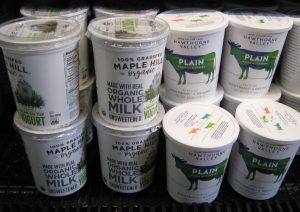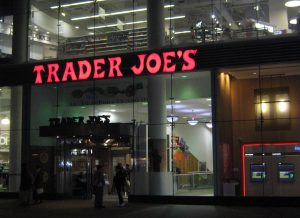




Organic plain yogurt made with milk from 100% grass fed cows is a big part of this mindful eater’s diet. Our yogurt directory now includes 31 yogurt makers in the U.S. and Canada using milk from 100% grass fed cows, sheep and/or goats.
The impressive watchdog within the organic industry, Cornucopia Institute, has developed an Organic Dairy Scorecard that takes into consideration whether dairy products are made with milk from 100% grass fed cows among other factors. Thirty-two farms/brands are evaluated as Top Rated dairy (beyond organic) and receive a scorecard rating of five cows; 33 farms/brands are rated Excellent dairy with four cows; 31 farms/brands are rated Unverified with three cows; 52 farms/brands are rated Lacking Transparency with two cows; and 12 farms/brands are rated Factory Farms with one cow.
A couple of years ago, we noted that Consumer Reports detailed the reasons why consumers should choose grass-fed meat and dairy products when possible. The non-profit organization’s reasoning deserves spotlighting again:
Grass-fed has a more healthful ratio of omega-6 polyunsaturated fatty acids to omega-3s. Too much omega-6 fats in your diet can cause inflammation, but omega-3s are anti-inflammatory. More of the saturated fat in grass-fed is stearic acid, a type of fatty acid that doesn’t raise blood cholesterol. Eating grass is also better for the cows: Grazing is a natural behavior, and cows that don’t eat grain are less likely to suffer from gastrointestinal problems. These benefits come into play, however, only if the animals were 100 percent grass-fed. Look for products with seals such as American Grassfed or PC) Certified 100% Grassfed to ensure that the claim was verified.
At home, my two favorite yogurts made with organic milk from 100% grass fed cows is easily obtainable at the Honest Weight Food Co-op in Albany, N.Y. But what to do while traveling away from home?
Other reliable venues to find similar quality yogurt might be farmers markets, like the Troy Waterfront Farmers Market, or other food co-operatives. As noted in our recent review of Jon Steinman’s Grocery Story, The Promise of Food Co-operatives In The Age Of Grocery Giants, there is increasing consumer support for food co-operatives, which generally offer much healthier food products.
But where in Manhattan, a not infrequent destination for this upstater, can a quality yogurt be easily purchased? As a mindful home cook (who watches the wallet, as well as wanting to know the ingredients in the food he consumes) passing on a restaurant lunch on a day trip to Gotham is typical. A simple lunch of a plain yogurt, some organic fruit and nuts, and whole grain bread is just right, and fruit, nuts and whole grain bread/crackers can be easily brown-bagged.
Unaware of any conveniently located food-cooperatives in Manhattan, Trader Joe’s has become a stopping place for its store brand plain organic yogurt made with milk from 100% grass fed cows.
A few years ago, we spotlighted a news article in the Albany Times Union on Who’s Making Trader Joe’s Food? when we spotlighted the consumer campaign in the Albany, NY area to bring a Trader Joe’s store to this region of upstate New York. In addition, the Cornucopia Institute’s dairy scorecard, in rating Trader’s Joes as Lacking Transparency with two cows, provided this additional information on Trader Joe’s organic dairy:
Store brands include organic milk that has been privately labeled by grocery chains. Typically, these businesses buy products wholesale and then market those finished or packaged products with their own labels. The inherent problem with private labels is that they lack transparency. Store brands may get their milk from highly rated producers, but they may also source from factory-scale dairies. Grocery chains or distributors typically offer low prices for store brands because they source the cheapest products available on the market at any given time. This variability in product sourcing makes it difficult, sometimes impossible, for consumers to determine where and how the products was produced. Cornucopia recommends caution with store brands like this one. Invested consumers can contact stores to confirm who is supplying their private-label milk and encourage them to be completely transparent about their sourcing—even when it changes.
And it cannot be denied that the Trader Joe’s chain, despite the countercultural feel of its stores, is part of a huge multi-national chain. Historical information on the Trader’s Joe’s page on Wikipedia, the free encyclopedia, notes that the first store was opened in 1967 by founder Joe Coulombe in Pasadena, California (where he died recently at the age of 89). But in 1979, German entrepreneur Theo Albrecht took over ownership of Trader Joe’s . As of 2019, Trader Joe’s had over 503 stores in 42 states and Washington, D.C. and is now owned by the Albrecht family, which also owns the German supermarket chain ALDI Nord, with over 10,000 stores in 20 countries. In the United States, the Albrecht family operates the Aldi stores as well as Trader Joe’s stores.
Nonetheless, away from home in the Big Apple, Trader Joe’s organic plain whole milk yogurt, made with organic milk from 100% grass fed cows and certified organic by Oregon Tilth (OTCO) makes for an inexpensive lunch for this consumer. And this particular yogurt sold by Trader Joe’s does receive 3 spoons our of 5 spoons in the Cornucopia Institute’s yogurt scorecard (a scorecard, separate and distinct from the dairy scorecard).
But might a food co-operative, open to the public, be in the planning works somewhere on the island of Manhattan? That would be much appreciated.
(Frank W. Barrie, 3/13/20)





